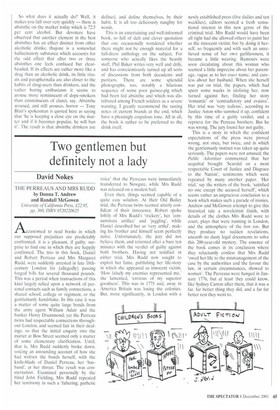Two gentlemen but definitely not a lady
David Nokes
THE PERREAUS AND MRS RUDD by Donna T. Andrew and Randall McGowen University of California Press, £22.95, pp. 360, ISBN 0520220625 Accustomed to read books in which our supposed prejudices are predictably confronted, it is a pleasant, if guilty, surprise to find one in which they are happily confirmed, The trio in this book, Daniel and Robert Perreau and Mrs Margaret Rudd, were suddenly arrested in late 18thcentury London for (allegedly) passing forged bills for several thousand pounds. This was a period when transactions of this kind largely relied upon a network of personal contacts such as family connections, a shared school, college or regiment, or the gentlemanly handshake. In this case it was a matter of some quite large bonds from the army agent William Adair and the banker Henry Drummond; yet the Perreau twins had respectable connections throughout London, and seemed fair in their dealings, so that the initial enquiry into the matter at Bow Street seemed only a matter of some elementary clarification. Until, that is, Mrs Rudd suddenly broke down, voicing an astounding account of how she had written the bonds herself, with the knife-blade of Daniel Perreau, her 'husband', at her throat. The result was consternation. Examined personally by the blind John Fielding, Mrs Rudd repeated her testimony in such a 'faltering, pathetic
voice' that the Perreaus were immediately transferred to Newgate, while Mrs Rudd was released on a modest bail.
Even then, things seemed capable of a quite easy solution. At their Old Bailey trial, the Perreau twins seemed utterly confident of their innocence. Robert spoke loftily of Mrs Rudd's 'trickery', her 'consummate artifice' and 'juggling', while Daniel described her as 'very artful', making his brother and himself seem perfectly naive. Unfortunately, the jury did not believe them, and returned after a bare ten minutes with the verdict of guilty against both brothers. Having not testified in either trial, Mrs Rudd now sought to exploit her fame, publishing her life-story in which she appeared as innocent victim. 'How falsely my enemies represented me,' she lamented, 'envious of my superior goodness'. This was in 1775 and, away in America Britain was losing the colonies, But, more significantly, in London with a newly established press (five dailies and ten weeklies), editors scented a fresh sensational interest in this new genre of the criminal trial. Mrs Rudd would have been all right had she allowed others to paint her as the innocent victim; but by doing it herself, so frequently and with such an unrelieved sense of her own guiltlessness, it became a little wearing. Rumours were soon circulating about this woman who seemed a little imprecise about her parentage, vague as to her exact name, and careless about her husband. When she herself was put on trial, the papers, which had spent some weeks in idolising her, now turned against her, finding her story 'romantic' or 'contradictory and evasive'. Her trial was 'very tedious', according to Justice Aston who summed it up, confident by this time of a guilty verdict, and a reprieve for the Perreau brothers. But he was wrong. The jury found her not guilty.
This is a story in which the confident expectations of the press were proved wrong, not once, but twice, and in which the gentlemanly instinct was taken up quite seriously. The papers were not amused; the Public Advertiser commented that her acquittal brought 'Scandal on a most respectable Court of Justice and Disgrace to the Nation', sentiments which were repeated by many another paper, 'Her trial.' say the writers of the book, 'satisfied no one except the accused herself, which seems rather an ungracious conclusion to a book which makes such a parade of ironies. Andrew and McGowen attempt to give this historical tale a novelettish finish, with details of the clothes Mrs Rudd wore to court, plays that were running in London, and the atmosphere of the bon ton. But they produce no sudden revelations, unearth no dusty legal documents to solve this 200-year-old mystery. The essence of the book comes in its conclusion where they reluctantly confess that Mrs Rudd 'owed her life to the mismanagement of the case by the authorities and the favour the law, in certain circumstances, showed to women'. The Perreaus were hanged in January 1776, but at least they could know, like Sydney Carton after them, that it was a far, far better thing they did, and a far far better rest they went to.






















































































 Previous page
Previous page